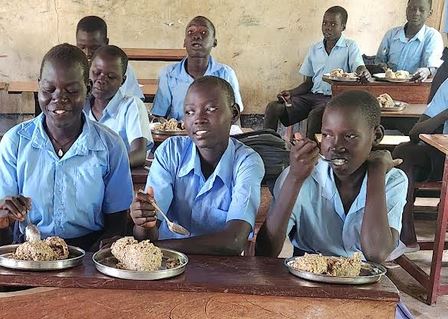Headteachers and educators in Eastern Equatoria State’s Kapoeta have hailed the school feeding program for high enrolment and retention of learners in school.
Sister Mary Nkatha Jenario, the headteacher of Mary Magdalene Primary School in Kapoeta North County, told Radio Tamazuj that since the start of the school feeding program by the World Food Program (WFP) in her school, the number of pupils has increased.
“The school feeding program has been very important to our schools and some years back the number of learners was very low but as the WFP keeps on bringing food to the school, I see the number of pupils has increased from 777 to 1,050. I feel this is very important and it is giving a good result because of this food being brought to the schools,” she explained. “Currently, the learners in the schools are happy compared to the children in the community there, so I want to thank the WFP for bringing food to the schools.”
Sr. Nkatha also said that since the school feeding program was introduced by the WFP, the number of girls in schools has also increased.
For her part, Metrine Akwam, a school teacher at Mary Magdalene Primary School, said the school feeding program is encouraging pupils to attend school every day which is also helping them grow.
“The feeding program is helping the children to come to school because most of them do not get anything from home so it is hard if they come to school and do not get food and go back home and find nothing,” she said. “It is helping with their growth and sustaining them in school because if there is no food in the school I do not think they will show up for classes.”
She encouraged parents to enroll their children in school for a better future.
Meanwhile, Josephat Kutyauripo, Project Manager for Food Assistance for Recovery at the Adventist Development and Relief Agency (ADRA), an implementing partner of the WFP in Kapoeta North and Kapoeta South counties said they are supporting a total of 13 schools in the two counties in the school feeding program.
He said daily, the learners receive a well-balanced diet of cooked food including, cereals, cooking oil, and either beans or peas given at the school every day as long as the institution has cooks and they are able to feed the learners and that most of the meals are served during lunchtime.
“When we meet the parents, they commend the program because it is assisting the children to have meals that they would be limited to have at home so some of them send their children to school so that they have these meals,” he said. “They are sending children to schools and they also benefit from the learning because these meals are not just given to anyone, they are given to pupils who are coming to learn.”
According to the WFP, they are also encouraging the schools to embark on school gardening to produce vegetables and preserve nature and for the learners to also learn the nutritional benefits of fruits and vegetables and the importance of a diverse and balanced diet.




